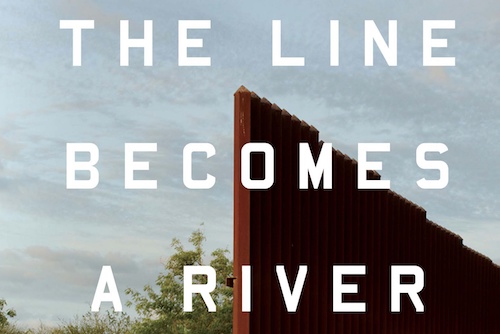Crossing lines on paper

It took the Reading Through It Book Club over a year to find a book on immigration that felt relevant to our current political situation. Finally, we all agreed on Francisco Cantú's brand-new memoir The Line Becomes a River: Dispatches from the Border.
Donna Miscolta is correct in her review for the Seattle Review of Books: Line is a beautiful, complex book. In fact, it's so beautifully written that I had trouble reading it critically for the purposes of the book club. Far too often, Cantú's prose mesmerized me, leaving me unprepared to discuss the immigration policies that are at the forefront of American consciousness right now.
Cantú's account of life on the Border Patrol is complicated, empathetic, and introspective. He sees horrors out there in the desert, and he is forced, repeatedly, to confront his own moral boundaries in uncomfortable ways.
Members of the book club pointed out last night that Line is not just a book about immigration. It's also a top-tier book of nature writing, and a book packed with observations about culture. Cantú understands that borders aren't just lines on maps: they exist in nature, and they shape our society. You're not just writing about international relations when you're writing about the border with Mexico; you're also writing about the harsh geography of the region, and the families that have been divided and broken by those imaginary lines.
We discussed the uncomfortable ways in which border policing takes its cues from law enforcement: born in the War on Drugs and escalated in the War on Terror, we expect our Border Patrols to treat the people they find in the desert as criminals. But what if we didn't look at crossing a border as a punishable offense? What if we weren't interested in crime and punishment, but rescue and repair?
But I'm doing a disservice to the book when I describe Line's gorgeous writing as a problem. In fact, the clarity and cadence of Cantú's prose helps identify at least one failing of the modern immigration debate: how a lazy selection of words can incriminate a whole group of people. When the media adopts the conservative frame and refers to these people as "illegal aliens," reporters are helping to dehumanize and otherize them. Sharp, thoughtful language can do more than just please an aesthetically picky reader — it can maintain and amplify the dignity of people in crisis.
In the end, American culture has referred to immigrants in a variety of ways: we've discussed them in economic terms, in security terms, in terms of demographics. But in his extraordinary book, Cantú refuses those generalizations. Instead, he demands that we think of them each, individually, as people with stories to tell.
(The next Reading Through It book club meets on June 6th at 7 pm at Third Place Books Seward Park. We'll be discussing Loaded: A Disarming History of the Second Amendment. The book is now on sale for 20% off at Third Place. We hope to see you there!)